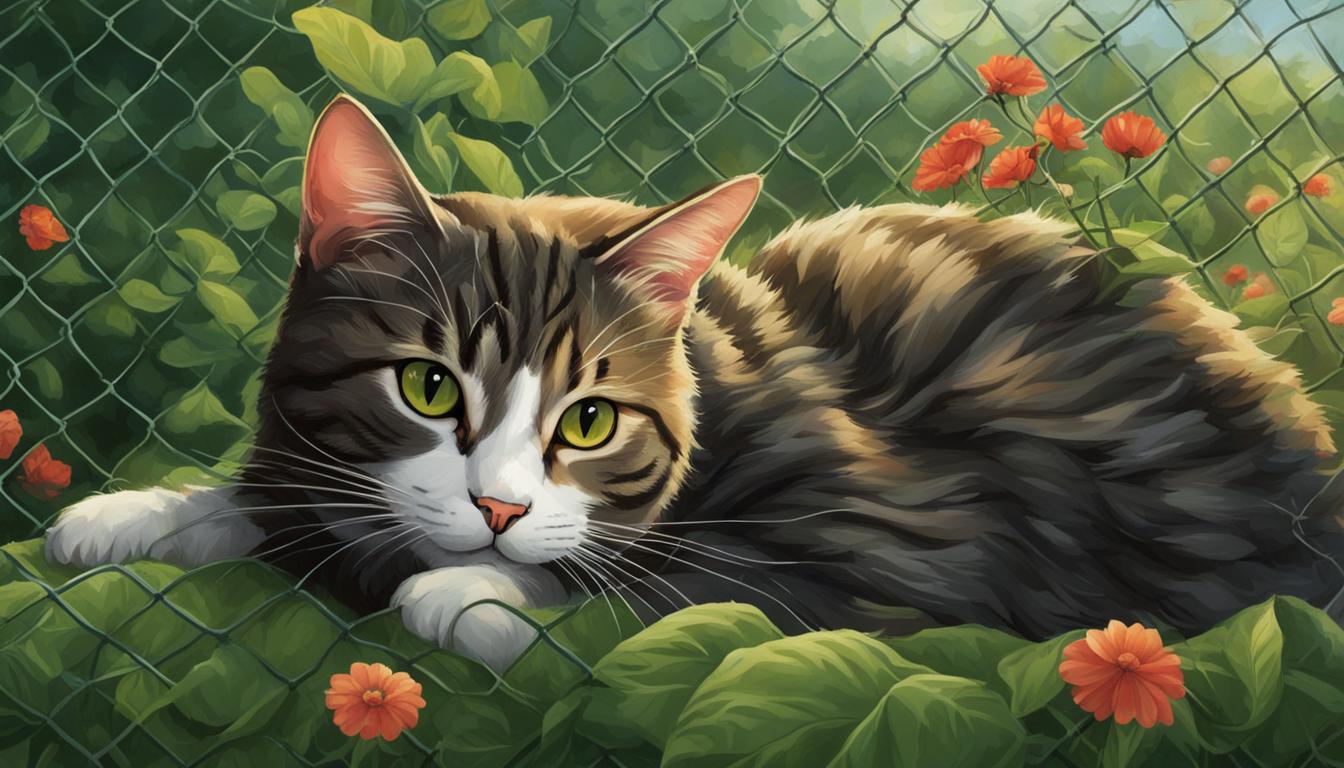Did you know that your furry friend can get heartworm just like dogs? Yes, it’s true. Heartworm in cats is something all cat owners should be aware of. These worms can live in the heart and lungs of cats, and can make them really sick. Feline heartworm disease is a big deal because it can lead to health problems that hurt your cat’s lungs and heart. Cats are experts at hiding when they don’t feel well, so this disease might be hard to spot. That’s why preventing heartworm infection in cats is the best way to keep them safe and healthy.
Sometimes, even small worms that aren’t grown up yet can harm your cat. Since there isn’t a special treatment for cats with heartworm like there is for dogs, the best thing you can do is make sure they don’t get it in the first place. Let’s learn how to keep our cats happy and away from these pesky worms!
Key Takeaways
- Cats can get heartworm, and it can be quite serious.
- Feline heartworm disease affects the heart and lungs.
- Prevention is key because there’s no specific treatment for cats.
- Even young heartworms can cause big problems for your cat.
- Making sure your cat is safe from heartworm is part of being a good pet owner.
Understanding Heartworm Disease in Cats
Have you ever heard about little worms that can live in cats and make them feel very sick? These worms are called heartworms, and they can lead to a big problem called heartworm-associated respiratory disease, or HARD for short. Cats can get HARD even when the worms are just little, not all grown up. Let’s learn how these worms live and grow inside cats.
Heartworms can live in a cat’s lungs and heart and cause trouble in breathing and other problems for the cat.
Before we talk more about these worms, let’s see a picture of what they look like:
What Is Heartworm and How Does It Affect Cats?
Heartworms are long, skinny worms that can be as big as a foot! They can live inside a cat’s heart and lungs, but they usually don’t grow to their full size in cats. These worms can hurt the cat’s lungs and make it cough. This is what we know as HARD in cats.
The Difference Between Canine and Feline Heartworm Disease
Dogs can have many grown-up worms in their hearts and lungs, but it’s different for cats. Most of the time, cats only have a few worms, and they are often not all grown up.
Life Cycle of Heartworms in Felines
The way heartworms grow in cats is quite amazing. It starts with a tiny worm called a larva which gets inside the cat when a mosquito bites it. This tiny worm then takes a journey inside the cat to become a big worm. Cats usually have fewer of these worms than dogs do.
| Heartworm Stage | In Cats | In Dogs |
|---|---|---|
| Larva | Enters with a mosquito bite | Enters with a mosquito bite |
| Immature Worms | Can cause HARD | Grow to become adults |
| Adult Worms | Few or none | Many can live in the heart |
Isn’t it interesting how these little worms can make such a big difference in a cat’s life? It’s important to protect them so our furry friends stay happy and healthy!
Transmission and Lifecycle of Heartworm in Cats
Did you know that tiny creatures from mosquito bites can make your furry friend sick? This happens when a mosquito with heartworm larvae bites a cat. These larvae are baby worms that can grow into big worms living in a cat’s heart and lungs. It’s important to know how these worms get to cats and what happens inside them after.
How Do Cats Get Infected with Heartworm?
Your cat can get heartworms from just one mosquito bite. This is why heartworm disease is one of the mosquito-borne diseases in cats. When the mosquito bites, it puts the heartworm larvae on your cat’s skin. Then, the larvae wriggle into the bite wound and start their journey inside your cat.
The Role of Mosquitoes in Spreading Heartworm
Mosquitoes are like the bus that carries the heartworm larvae from place to place. If a mosquito bites an infected animal and then bites your cat, it can pass the larvae on. This can happen indoors or outside, so all cats, even indoor ones, can be at risk.
Understanding the Developmental Stages of Heartworms in Cats
The worms inside your cat go through several growth stages. It takes about six months for these larvae to become adult worms. Here’s how they grow:
| Stage | Location in Cat | Time to Next Stage |
|---|---|---|
| Larvae (L3) | Skin at bite site | 1-2 days |
| Larvae (L4) | Moving through tissues | About 1 month |
| Immature Adult | Heart and lungs | 3-4 months |
| Adult Worm | Heart and lungs | Can live up to 2-3 years |
Knowing about heartworm larvae development helps us understand how to protect our cats. The best way is with medicine that stops the larvae from growing. Remember, even if your cat stays indoors, it’s still good to give them medicine to keep them safe from heartworm.
Can Cats Get Heartworm?
It might come as a surprise, but yes, your fluffy friend can get heartworms. This is a big problem that happens to cats everywhere, even in all 50 states! See, the thing is, tiny bugs called mosquitoes are often the ones that give cats these icky worms. The mosquitoes bite wildlife animals that are carrying the worms and then go bite cats. That’s how cats get heartworms inside them.
It’s hard to guess which cats might get sick because there are a lot of things that raise the risk of heartworm in cats. Cats that play outside might meet more mosquitoes, and that means they can have a higher chance of getting heartworms. However, cats that stay inside can get bitten by mosquitoes too. So, all cats need to be safe from these worms.
Here’s what you can do to help keep your friends safe:
- Use medicine that stops heartworms. Your vet can help you pick the best one.
- Try to keep mosquitoes away, like fixing window screens and using bug spray.
- Take your cat to the vet for check-ups to make sure they are worm-free.
Here’s a table that shows what it looks like when cats are not safe from heartworms and when they are:
| Not Protected from Heartworms | Protected from Heartworms |
|---|---|
| Can get sick from heartworms | Stays healthier without heartworms |
| Needs more vet visits for sickness | Visits vet for regular check-ups only |
| It’s stressful for cats and their families | Cats and their families can be more relaxed |
Think of it this way: taking care of your cat and protecting cats from heartworm is a bit like wearing a helmet when riding a bike. It keeps your head safe just like heartworm prevention keeps your cat safe.
Recognizing the Symptoms and Diagnosing Heartworm in Cats
If your cat is acting a little strange, it might be more than just a bad day. Cats can get a nasty bug called heartworm that makes them feel really sick. Some signs of heartworm in cats include coughing, not wanting to eat, losing weight, or having trouble walking. Some kitties might even pass out because it’s so rough for them. It’s super important to know these signs so you can help your furry friend feel better.
Identifying the Signs of Heartworm Disease in Cats
Here’s a list of things to watch out for in your cat that could mean they have heartworm:
- Coughing like they have a hairball they can’t get out
- Not feeling like eating their yummy food
- Getting skinny because they’re not eating enough
- Acting really tired or not wanting to play
- Having a hard time breathing, almost like they just ran a race
Your vet can check if your cat has heartworms by doing a special test. Even if your cat stays inside, they can still get heartworm, so it’s good to get them checked out.
The Diagnostic Process for Heartworm in Felines
When you take your cat to the vet because you think they might have heartworms, the vet will do some tests to be sure. Your vet will probably take a little bit of blood and check it with a test that says yes or no to heartworms. Sometimes, they might need to do some extra tests like an x-ray or an ultrasound to look at your cat’s heart and lungs because these are the spots where heartworms like to live.
Treating Heartworm Disease in Cats: What You Need to Know
Here’s the tricky part – there isn’t a special medicine to fix heartworm in cats like there is for dogs. That means taking care of your cat if they have heartworms is mostly about keeping them comfy and happy. It’s all about lots of love, making sure they eat and drink, and sometimes giving them medicine to help with symptoms. And remember, the best thing to do is keep your cat safe from heartworms with a special medicine they take before they even get sick.
To keep track of it all, here’s a table that shows you what to do if you think your cat has heartworms:
| What You See | What It Might Mean | What to Do |
|---|---|---|
| Coughing a lot | Could be signs of heartworm | Visit the vet |
| No appetite | Another sign of heartworm | Talk to the vet about tests |
| Looking weak or thin | Heartworm can make them lose weight | Ask the vet for a check-up |
| Hard time breathing | Heartworms might be hurting their lungs | Get an x-ray or ultrasound |
| Playing less | They could be feeling really tired | Keep them relaxed and comfy |
By knowing the signs and getting the right tests and care, you can help make sure your cat stays happy and healthy!
Preventing Heartworm Infection in Cats
Keeping your kitty free from heartworms is a big deal. Even if your furry friend doesn’t go outside, it can still get sick. Mosquitoes, the tiny bugs that carry heartworm, can come into any home. You can help your cat by giving it medicine that fights heartworms. This medicine stops baby heartworms from growing up inside your cat.
The Importance of Year-Round Prevention
Heartworms don’t take a break, so your cat’s protection shouldn’t either. Give heartworm prevention medicine to your cat all through the year, so it’s always safe. This way, you’re keeping your cat happy and healthy, no matter what season it is.
Understanding Heartworm Preventive Medication for Cats
Medicine that stops heartworms comes in different kinds like pills, liquids, and even spots-on-the-skin treatments. Your vet can help pick the best one for your cat, and tell you how often to use it. It’s super important to follow the schedule the vet gives you for this medicine.
How Indoor Cats Are Also at Risk for Heartworm
Just because your cat lives inside doesn’t mean it’s safe from heartworm. Those pesky mosquitoes can sneak in and bite your cat, passing on the heartworm babies. That’s why indoor cats need the same heartworm protection as outdoor cats.
Heartworm disease is sneaky and can hurt your cat in big ways. Don’t wait until it’s too late—talk to your vet about preventative measures for heartworm and getting started on feline heartworm prophylaxis right away.
| Type of Preventive | How it’s Given | How Often to Use |
|---|---|---|
| Pills/Chewables | Orally | Once a Month |
| Topical (spot-on) | Applied on the skin | Once a Month |
| Injectable | By the vet | Every 6 or 12 months |
Remember, it’s always better to prevent a disease than to treat it. So, give your cat its heartworm medicine on time, and keep those little bugs away for good!
Conclusion
Heartworm disease is as scary for cats as it sounds. These tiny worms can make our purring friends very sick, and keeping them away is super important for their health. To keep your cat safe, there are special medicines that stop these worms before they can harm your pet. Remember, even though cats are tough, they can’t fight off heartworm all on their own and there’s no strong medicine to cure them once they’re sick. But with your help in preventing it, your cat can stay happy and healthy.
You play a big part in protecting your cat by using heartworm prevention medicine. It works best when given all year round, and it’s something simple you can do to help your furry friend. Even cats who live inside all the time need to be safe from these worms because mosquitoes can sneak in and bite them. By taking your cat to see the vet for regular check-ups, you’re doing a great job at safeguarding feline health.
By understanding how heartworm can affect your cat, watching out for any signs of sickness, and keeping up with prevention tips, you’re doing the best you can to take care of your cat. Always chat with your vet about the right medicine to prevent heartworm and make sure you follow their advice. This way, you and your cat can enjoy lots of fun times together without worrying about these pesky worms.
FAQ
Can felines be infected with heartworm?
Absolutely, cats can contract heartworm disease. Although less common than in dogs, feline heartworm disease is a severe condition that can lead to health issues like lung disease, heart failure, and organ damage.
What is heartworm and how does it affect cats?
Heartworms are parasites that live in the heart, lungs, and blood vessels of infected animals. In cats, they can cause heartworm-associated respiratory disease (HARD) and damage to other organs. Even immature worms can be harmful to a cat’s health.
How is feline heartworm disease different from that in dogs?
The primary difference is that most heartworms do not reach adulthood in cats. However, cats can still suffer from HARD due to immature worms. Cats also typically harbor fewer worms than dogs and are considered atypical hosts for the parasite.
Could you explain the life cycle of heartworms in felines?
The heartworm life cycle in cats is complex. Mosquitoes play a critical role as they transmit the larvae from an infected host to a cat. The larvae then mature into adult heartworms over about six months within the cat’s body.
How do cats get infected with heartworm?
Cats get heartworm disease through the bite of an infected mosquito, which deposits heartworm larvae onto their skin. These larvae then make their way into the new host’s bloodstream and eventually mature into adult worms.
What role do mosquitoes play in spreading heartworm?
Mosquitoes are essential for the transmission of heartworms. They pick up heartworm larvae when they bite an infected animal and pass them on to new hosts, such as cats, when they bite them.
Can you describe the developmental stages of heartworms in cats?
The developmental stages of heartworms in cats begin when larvae enter a cat’s body and migrate through the tissues to reach the vessels of the lungs. Over a period of several months, they develop into adult worms that can cause significant damage, even if they do not reach full maturity.
What factors increase the risk of heartworm in cats?
The risk factors for heartworm infection in cats include exposure to mosquitoes and the presence of wildlife carriers. Since mosquitoes can get inside homes, even indoor cats are at risk, and geographic location can also play a role as heartworms are diagnosed in cats across all 50 states.
How can you recognize the signs of heartworm disease in cats?
Symptoms of heartworm disease in cats may include coughing, loss of appetite, weight loss, difficulty walking, and fainting. Because these signs can mimic other conditions, it’s crucial to have a vet perform a heartworm test for an accurate diagnosis.
How are heartworms diagnosed in felines?
Heartworms in cats are diagnosed through a combination of physical examination, medical history, blood tests, and imaging such as chest radiographs or ultrasound if needed. Because feline heartworm disease can be difficult to detect, multiple tests may be necessary.
What should I know about treating heartworm disease in cats?
Currently, there is no approved treatment for heartworm infection in cats like there is for dogs. Therefore, the focus is on managing symptoms and preventing the disease since heartworm treatment options for cats are limited and can be risky.
Why is year-round prevention important for protecting against heartworm in cats?
Year-round prevention is crucial because it is the only reliable method to protect cats from the effects of heartworm disease. Preventive medications target the immature stages of heartworm and are vital due to the unpredictability of mosquito exposure.
How do heartworm preventive medications work for cats?
Heartworm preventive medications work by eliminating the larval stages of the heartworm parasite. These medications should be given on a strict schedule, as prescribed by a veterinarian, to ensure continuous protection against heartworm.
Are indoor cats also at risk for heartworm?
Yes, even indoor cats are at risk for heartworm because infected mosquitoes that get indoors can bite them. Thus, prevention is recommended for all cats, regardless of their living situation.


